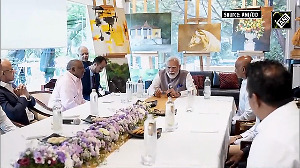'Even if we have laws in place, which we must, we need a societal change.'
'Rather than telling our daughters that, "Listen, leave your house at so and so time, come back by so and so time," we must tell the men and boys that "Whatever point of time you encounter a woman in public space or wherever, you treat her with respect, dignity".'

Priyanka Chaturvedi, the Rajya Sabha MP from the Shiv Sena Uddhav Balasaheb Thackeray party, outlines in this interview with Prasnna D Zore/Rediff.com how societal change can best serve the interest of women's safety and security.
Chaturvedi, on August 19, wrote to President Droupadi Murmu asking her to give her assent to the Shakti Bill [Shakti Criminal Laws (Maharashtra Amendment) Bill, 2020 and the Special Court & Machinery for Implementation of Maharashtra Shakti Criminal Law, 2020], which has been pending with Rashtrapati Bhavan since its enactment by both Houses of the Maharashtra legislature.
A day later, on August 20, Badlapur, a rapidly urbanising town in Maharashtra's Thane district, witnessed a day-long rail roko by angry women from the town in protest against the sexual molestation of two school girls, aged 4, against the insensitivity of the local police in registering an FIR against the accused and charges of political patronage to those running the school where the molestation took place.
- Part 1 of the interview: 'It's Time Women Said Enough Is Enough'
Questions are being raised about the timing of your letter to the President. You write a letter to the President asking her to expedite her assent to the Shakti Bill not from June 2022 till now, but write only when something like the R G Kar rape case has happened in Kolkata. How would you respond to such allegations?
I would say people have welcomed it. I want the Shakti Bill to come into effect because it's just pending a presidential nod. It's just a Constitutional nitty-gritty that needs to be done. And if we bring in such a law, it would probably become a model law which other state governments would follow -- probably a West Bengal will follow.
How does it become political?
As a woman who says, 'Ma'am, all you need to do is say, yes, this is a good bill. It will empower the women of Maharashtra. Ensure that their safety and security is addressed. Ensure that children, girls who step out of their schools, homes, or wherever are safeguarded with women's law.' How is it called even political? No part of my letter makes it political.
It just says, 'It is Raksha Bandhan. We have a commitment to safeguard interest, safeguard security, safeguard everything related to women. This will be the best gesture you can put out there by giving them a law.'
It's not a policy which is in the making. It's not a policy which is being debated, discussed. It's not a policy which has seen controversy.
It's a law which has been cleared by the Maharashtra legislature which includes the Bharatiya Janata Party, which includes that faction (Eknath Shinde led Shiv Sena) also which has split away from us who were on our side and have given agreement to it. It includes the Congress, the then undivided NCP, the Samajwadi Party. It includes all the other smaller parties which have independently discussed and debated and then legislated Shakti.

Has there been any change in how safe women feel in India ever since we witnessed huge outrage against the Nirbhaya rape case in 2012?
Would Shakti bring about that change?
Shakti would come into effect only after an incident of rape or molestation has happened. It will lead only to fast tracking of the case and a speedy trial at best.
The important question is: What should be done to stop sexual molestation and rapes of women?
Can I tell you the basic difference?
When Nirbhaya happened, the entire country outraged. Based on the Verma Commission report, a strict law was brought into place.
A fast track court was set up and Nirbhaya case was tried in that fast-track court. How many years did it take for her case to reach its logical conclusion? Seven years. Seven years is too long a time to wait for justice.
The difference in Shakti is this: Within 15 days, investigation is over. Within 30 days, the trial begins.
Where does the trial begin? Trial begins in a specially mandated court which only addresses women and child crimes.
Who is investigating this case within 15 days? It is a special police investigating team focused only on women and child crimes.
That is where the difference lies.
By the virtue of a strict law, which is time bound, which is leading to definite prosecution in the shortest amount possible, a commitment coming from the government will also instill a sense of fear that if we (rapists and molesters) do this, we will have exacting consequences to face and those would be heaped on us much sooner than later.
What has happened is there's no fear of law. The crime scene is manipulated. A crime scene is totally damaged. A crime scene is totally ill researched or ill investigated because of lack of resources. We were committing all of that.

Women can only live in hope. And this (the Shakti Bill) brought in a sense of hope.
After several rounds of discussions, several rounds of debates, when this policy was drafted by people from across political parties, after hearing all sides, hearing women activists, hearing NGOs, we live in hope and ability to be able to instill a sense of fear (in the rapists).
But more than that, even if we have laws in place, which we must, we need a societal change. Rather than telling our daughters that, 'Listen, leave your house at so and so time, come back by so and so time,' we must tell the men and boys that 'Whatever point of time you encounter a woman in public space or wherever, you treat her with respect, dignity, and as an equal participant in these public spaces.'
This societal change needs to come as an active focus point from civil society, from families, from various sections of society, from various religious groupings, from the temples, from the mosques, from the churches, from the gurdwaras. It's a message that needs to be told and repeatedly told so that it becomes a norm.
That is the only way we can stop rapes and molestation of women and small children.
If we involve large followers of religion, sects and engage them to ask their followers to consciously work towards putting an end to male domination in our society and the patriarchy that is so deeply ingrained in our society then we would have done a big service to women's safety and security.
But then you have a prime minister talking from the Red Fort, speaking about safety of women in the context of the rape and murder of the young doctor in Kolkata even though he did not quite name West Bengal, but the same prime minister stays quiet on Manipur, Hathras and Brijbhushan Sharan Singh.
On Manipur, he spoke for all of 34 seconds. 34 seconds!
Photographs curated by Anant Salvi/Rediff.com











 © 2025
© 2025